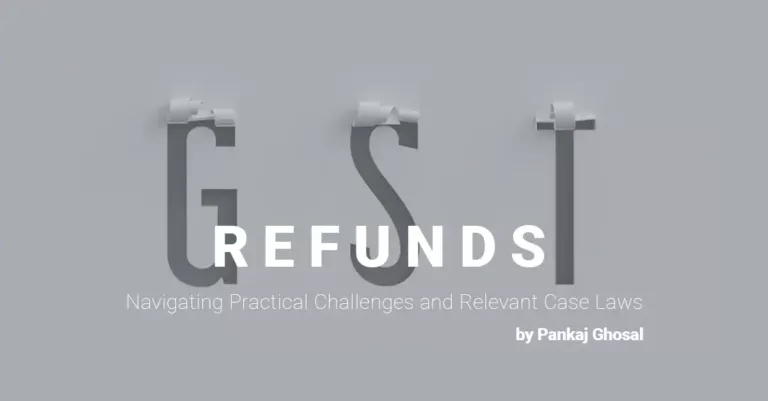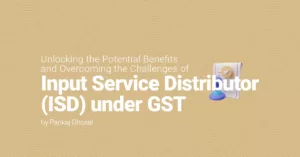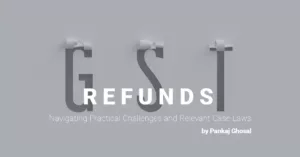Pankaj Ghosal
The online gaming sector has been expanding at a rapid rate in recent years. Companies in the gaming business have grown rapidly with the popularity of online and mobile games, to the point that they are now significant economic drivers. Yet, the obligation of paying taxes, such as Goods and Services Tax (GST), come along with expansion.
What’s GST
Goods and Services Tax is a tax levied on the sale of digital items and services sold by businesses in India. The Goods and Services Tax (GST) rate for online gambling is 18%, calculated on the whole purchase price. Yet, various court challenges have been filed upholding or rejecting the applicability of GST to gambling enterprises.
Some Rulings In Favour Of GST
In 2020, a group of gaming firms took the government’s planned application of GST on their services to the Karnataka High Court. Companies claimed that GST shouldn’t apply since eSports are a game of ability, not chance. Yet the court ruled that Tax applies to online gaming since it is considered gambling under the GST Act.
In 2021, a gaming firm contested the GST’s application to the selling of virtual money inside their game before the Gujarat High Court. The business claimed that GST should not apply to virtual money since it was neither a “good” nor a “service” under the GST Act. But the court disagreed, and it ruled that virtual money is a service that must pay GST.
These examples illustrate the difficulties encountered by the gaming industry while implementing GST. The Goods and Services Tax (GST) has important legal and financial ramifications for the gaming industry, and it is imperative that businesses in this sector be aware of them. Penalties and legal action may be incurred for noncompliance.
Non-Compliance And Ramifications
Recent news articles state that the Indian government’s Enforcement Directorate (ED) is looking into allegations of Rs 23,000 crore worth of GST avoidance by Indian online gaming businesses. Many prominent Indian gambling businesses are reportedly being probed. According to reports, the ED is looking into the firms’ books to see whether the appropriate Tax has been collected. The government body has suspicions that the businesses were trying to avoid paying GST on the full amount of their transactions in order to conceal their true financial standing.
Millions of Indians now regularly engage in online gaming on a variety of platforms, from smartphones and tablets to personal computers. Nonetheless, there have been a number of regulatory hurdles that the business has had to overcome, such as those involving gaming regulations and the GST.
Here Are Some Of The Key Issues Of GST On Gaming Companies Is Complex And Multifaceted, With Several Factors:
-
The primary problem is determining how to categorise video games for Goods and Services Tax (GST) purposes. Video games, mobile games, internet games, console games, and other sorts of games are just a few of the many options available to gamers today. Video games may be purchased in a variety of formats, including physical media, digital downloads, and subscription services. It may be difficult to establish a clear and consistent methodology for categorization since GST consequences may vary depending on the kind of game (Say, in the case of "Minecraft" (2019), the Hyderabad bench of the Goods and Services Tax Appellate Tribunal (GSTAT) ruled that the game should be classified as a "puzzle game" rather than an "electronic amusement game". As a result, the game was eligible for a lower GST rate of 12% and in the case of "Dream11 Fantasy Pvt. Ltd." (2020), the Bombay High Court held that the GST rate applicable to online fantasy sports games should be based on the classification assigned by the CBFC. The court ruled that if the game is classified as a "game of skill" by the CBFC, it would be exempt from GST, while if it is classified as a "game of chance", it would be subject to GST at the standard rate)
-
Determining the location of suppliers is a second concern for gaming organisations. A game's point of supply might be its site of development or production, or it can be the location from where it is downloaded and played. The global reach of internet gaming makes this a potentially tricky issue (Sega Games Ltd. v. Union of India (2019): In this case, the Delhi High Court held that the location of the supplier of online games would be determined based on the place where the supplier has established his business. The court held that if the supplier is established outside India, the place of supply would be the location of the recipient of the services and GST Council v. Bharti Airtel Ltd. (2020): In this case, the Delhi High Court held that the location of the supplier of gaming services would be determined based on the place where the services are actually performed. The court held that if the services are performed in India, the place of supply would be in India, even if the supplier is located outside India.)
-
International business deals: another concern is the treatment of international business deals involving gaming businesses. Things like cross-border tax consequences and import/export regulations fall under this category. Given the complexity of the international gaming market, it may be difficult to establish a uniform and equitable structure for transactions that across national borders.
-
Lastly, the question of how to levy tax on in-game acquisitions like virtual goods, currencies, and other products arises. Yet, the taxation of in-game purchases is still unclear in many nations. The fact that players of many games come from multiple countries, each with its own set of tax rules and regulations, adds another layer of complexity to the problem. (Say, Skill Lotto Solutions Pvt. Ltd. v. Commissioner of GST and Central Excise (2018): In this case, the Delhi High Court held that virtual currency used in online gaming platforms would be considered as 'goods' under the GST regime. The court also held that the supply of such virtual currency would be taxable under the GST and Alok Sharma v. Union of India (2018): In this case, the Madhya Pradesh High Court held that online games, such as rummy and poker, would be considered as 'games of skill' and not 'games of chance'. The court held that the GST would be applicable to the transaction fees charged by online gaming platforms for hosting such games of skill)
Conclusion
With the implementation of the Goods and Services Tax (GST) in 2017, the gaming sector in India has been grappling with several complicated difficulties. The following are some potential solutions to these problems:
-
Games need to be categorised so that the GST Council can set rates for each subset. As it is not clear whether video games available online can be considered products or services, several tax policies apply to this sector.
-
The gaming industry and its customers are not well-informed about the Goods and Services Tax (GST) and its potential impact on the gaming industry. If the government really wants to make sure that GST rules are followed, it must put its energy into launching awareness campaigns and educating stakeholders.
-
It would be beneficial to streamline the tedious and time-consuming GST procedures that gambling enterprises must go through. The government should make an effort to streamline procedures and lighten the regulatory burden placed on gaming businesses.
-
The gambling sector should be able to take advantage of input tax credit for purchases of services used in their operations. As a result, the industry's total tax burden will decrease, which will spur economic development.
-
To encourage innovation and startup activity in the gaming industry, the Goods and Services Tax (GST) should be waived for enterprises with yearly revenues below a particular level.
In conclusion, regulatory changes, education, and streamlining of procedures are all viable solutions to the gaming industry’s complicated problems under GST in India. To make sure their concerns are taken into account, the business sector should also be represented in policymaking.

Pankaj Ghosal
Experienced Chartered Accountant with a demonstrated history of working in the financial accounting industry. Skilled in Internal Audit, Accounting and GST compliance and litigation matters. Strong finance professional graduated from The Institute of Chartered Accountants of India.
















